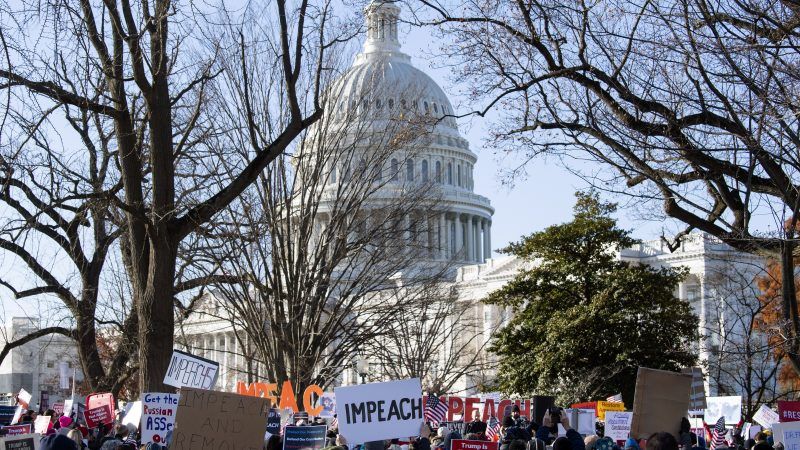Impeachment Is Good for a Healthy Democracy. But What About for the U.S.?
Trump is impeachable, but the process might exacerbate political tensions without resolving anything.

Donald Trump has almost certainly engaged in impeachable acts. Without getting into the wilder charges against the president, such as accusations of "treason," his dealings with the Ukrainian government demonstrate him misusing the powers of his office to get a foreign government to act against (also corrupt) political opponents.
But is yet another round of posturing for the television cameras with little hope of convicting and removing the president worth widening the yawning partisan chasm that divides Americans and turns the dysfunctional government into a weapon over which factions fight for control?
The answer to that question isn't clear.
As to impeachability, many legal experts agree that President Trump has overstepped the bounds of acceptable conduct.
"Impeachment has always been, first and foremost, a constitutional defense against executive misuse of power," writes University of Missouri Law Professor Frank O. Bowman III, author of High Crimes and Misdemeanors: A History of Impeachment for the Age of Trump. "Mr. Trump's behavior is a classic example of abuse of presidential power for personal or political gain, and is therefore properly impeachable," he adds about the president's Ukraine dealings.
"An impeachable abuse of power can be based on a corrupt scheme that misuses powers that the President had been given to faithfully exercise," agrees the Berkeley School of Law's Orin S. Kerr, writing for the Volokh Conspiracy. "What Trump did strikes me as pretty much the scenario you would have described if someone had asked you, before the Trump presidency, what kind of Presidential acts are impeachable."
And that's exactly what the first of two articles of impeachment passed last week by the House Judiciary Committee specifies (the second cites obstruction of Congress):
Using the powers of his high office, President Trump solicited the interference of a foreign government, Ukraine, in the 2020 United States Presidential election. He did so through a scheme or course of conduct that included soliciting the Government of Ukraine to publicly announce investigations that would benefit his reelection, harm the election prospects of a political opponent, and influence the 2020 United States Presidential election to his advantage.
Officeholders aren't supposed to abuse the power of their office for personal gain, or to benefit themselves politically, or to punish their enemies.
If you're about to point out that abusing power is business as usual for government officials… well, you're right. Even if we just confine ourselves to abuses intended to benefit friends and punish enemies, we can point to the long-established role of the IRS as a political hit squad at the very least. We could also point to the FBI's long and unsavory history of meddling in politics on behalf of the powers-that-be.
Presidents generally get away with such abuses because they can—they have the political cover to turn the power of the state to their own ends. Repeated without consequences, corrupt conduct becomes normalized and contributes to the metastasizing power of the presidency at the hands of both Republicans and Democrats.
Some of my colleagues hope that Trump's vulnerability allows an opening to not just punish a misbehaving official, but to rein-in the presidency itself. By finally imposing a penalty for abusing the powers of the office, Congress might reassert some of its own surrendered authority and put clearer boundaries around the behavior of chief executives to come, they suggest.
That's an attractive argument in many ways, since it recognizes that getting rid of one politician doesn't solve the problems inherent in the office he holds. We just might be able to impose some limits on government as a whole by impeaching Trump and (although this is unlikely to happen) removing him from office. Or, we just may fan the flames of political warfare in a country that has turned elections and policy choices into a vindictive grudge match that's escalating toward an uncertain but nasty outcome.
A general perception of impeachment as mere inter-party brawling seems highly likely given the partisan divide over the issue. The general public is evenly divided with 45 percent favoring impeachment and 47 percent opposed in the latest CNN poll—but support for the effort coming from 77 percent of Democrats and only 5 percent of Republicans.
The process is almost certain to stop short of removal from office, since Republicans control the Senate and show little interest in deposing the head of their own party, no matter his flaws.
Impeachment, then, seems fated to exacerbate political tensions without resolving anything.
Does that mean abusive presidents should get free passes if their followers are sufficiently angry and the political climate is tense? That seems unjust and unwise—especially since the most dangerous politicians are often those with the most fanatical base. But lots of presidents have enjoyed free passes simply because their followers dominated the government. Larger considerations beyond the specific misdeeds of officials are inherent to efforts to remove them from office outside regularly scheduled elections.
"The impeachment of presidents is a political act, performed with one eye on history, but ultimately constrained only by the political norms, popular expectations, and factional alignments of the era in which a particular impeachment is attempted," Bowman noted in his book.
America's political culture, less than a year before a national election, is a hot mess. Its government is broken and a danger to the people. The country is presided over by a chief executive who not only abuses his power but flaunts his conduct. In doing so, he enjoys the support of a faction of the public equal in size to the one that despises him—and those factions hate each other. The impeachment process is one more reason for them to fight.
Reining-in not just this president, but the presidency itself, is a worthy and necessary goal. But it's not obvious that impeachment is the best way to solve the country's serious political ills.


Show Comments (163)